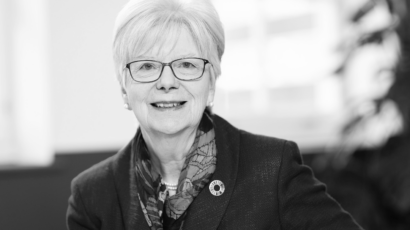
Seizing the business opportunities of net zero with Emily Shuckburgh and Simon Carter
In a Chapter Zero webinar on 20 January 2022, British Land CEO Simon Carter and Emily Shuckburgh, Director of Cambridge Zero and Professor of Environmental Data Science at the Department of Computer Science and Technology at the University of Cambridge, discussed the breadth of business opportunities from those created by scientific and technological developments and innovating with new business models, to building strategic partnerships and finding routes to new markets.

Dr Emily Shuckburgh
Director of Cambridge Zero and Professor of Environmental Data Science at the Department of Computer Science and Technology at the University of Cambridge
Simon Carter
Chief Executive Officer of British Land
Emily Farnworth
Co-Director of the Centre for Climate Engagement at the University of CambridgeTop takeaways
- Explore new partnerships. Collaboration within and between different sectors can expand horizons and open up new opportunities and solutions.
- Seize the opportunities for innovation that already exist but have yet to be realised. There is a lot of potential in innovations that already exist and research that is currently being done.
- Be bold in this space. British Land originally set bold net zero targets, and they are glad they did: making bold moves can give you a commercial advantage.
- Take a more holistic view. A systems perspective can build a deeper understanding. For example, the University of Cambridge has launched an aviation impact accelerator as a model that could potentially be applied to other sectors. It looks at the whole sector, supply chains, and connecting them with regulation and behavioural changes needed.
[COP26] sent a pretty clear signal that this is the end of the fossil fuel era and the start of a new era, and that is the environment in which business is going to be sitting in the coming decade.

Prof Emily Shuckburgh, Director of Cambridge Zero at University of Cambridge
Technological innovation, new business models and major restructuring of entire economic sectors will contribute to the net zero transition, providing significant opportunities for companies and business leaders. But to be at the front of the transition businesses need to seize those opportunities today.
Speaking from experience
Simon Carter shared examples of actions that FTSE100 property company British Land has been taking to reach its net zero by 2030 target. Since setting the target it has cut its greenhouse gas emissions by 73% in the decade up to 2020.
One action the company has taken is to set up its own ‘transition vehicle’ to disincentivise embodied carbon emissions in new developments. They set an internal levy of £60 per tonne of carbon dioxide embodied in a new building. This pays for offsets and helps finance carbon-saving retrofits of existing properties.
Innovation has been key to the progress made so far for the supply of low-carbon building materials and technologies, clearing regulatory hurdles and new technological inventions. Looking ahead there will be a range of challenges. The company has a complex supply chain to consider when building new properties. They also need to consider customers and tenants, which makes collaboration an important factor when addressing Scope 3 emissions.
How can you make the case for seizing the net zero opportunity to the board?
- Have a broader perspective and make sure that net zero is integrated into the wider strategy
- Understand the cost of the transition and how that will be communicated with the company
- Working with your CSR or sustainability committee to define and refine the strategy can help provide comfort to the board
- Understand and be able to explain your carbon footprint and where action is required
- Look for and acknowledge the opportunities as well as the challenges.
Collaboration across sectors
Collaboration within and between different sectors can expand horizons and present new opportunities and solutions. Emily Shuckburgh highlighted this through Cambridge University’s work to achieve its own challenging target to reach absolute zero emissions, without using offsets, from energy consumption by 2038. They are currently exploring alternative partnerships, for example potentially working with the council to manage heat networks.
Collaborative approaches to intellectual property and innovations could help whole sectors. Simon Carter said: “Our view is that given how important this is to the world, we are happy to share our ideas with competitors and equally, when they have great ideas, they do the same.” A good example is other businesses adopting the idea of a transition vehicle.
Exploring the risks and opportunities
This wide-ranging conversation revealed that a major business and a leading university have much in common as they face the opportunities and challenges of the net zero imperative. In the Q&A portion of the webinar, Emily Shuckburgh and Simon Carter discussed questions including:
- How can businesses choose the best innovations amid a plethora of emerging technologies and new thinking?
- What challenges does the Covid-19 pandemic and the shift to home working present to the net zero agenda?
- How do you assess climate-related risks among all the other risks companies have?
- How can public scepticism about ‘greenwashing’ be addressed, especially concerning the use of carbon offsets?
Watch the event recording
To hear the Q&A section of the discussion, watch the event recording below from 31:45.



